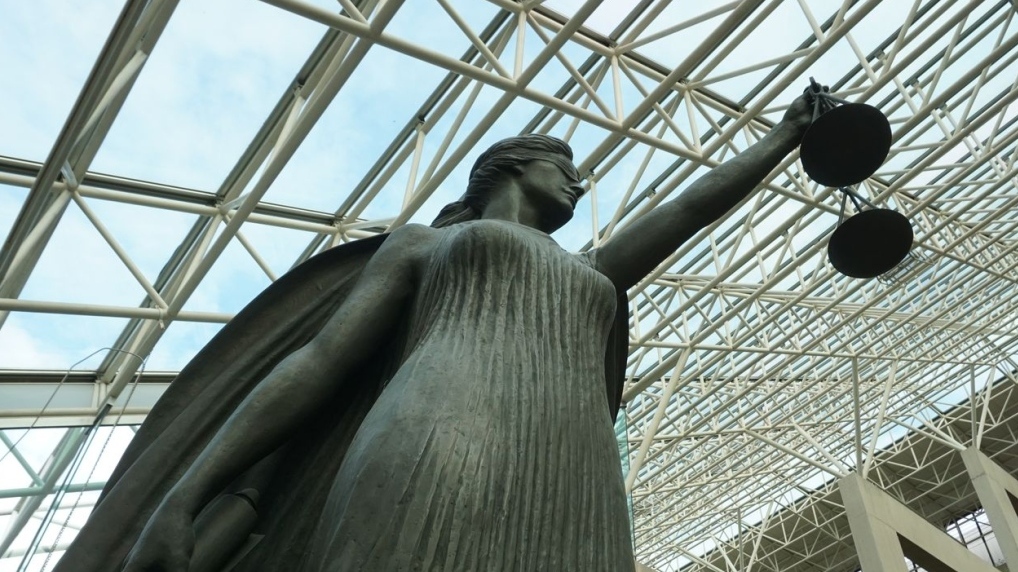B.C. First Nations plan to appeal ruling to restore natural river flows 70 years later
 A file photo shows a statue inside the B.C. Supreme Court in Vancouver, B.C.
A file photo shows a statue inside the B.C. Supreme Court in Vancouver, B.C.
Two First Nations say they will appeal parts of a British Columbia Supreme Court ruling released last month that rejected their bid for an injunction to restore the natural flows of the Nechako River.
The river in central B.C. has been diverted for 70 years to generate hydroelectricity for mining giant Rio Tinto's aluminum division and the province's power grid.
The Saik'uz and Stellat'en First Nations announced Thursday they plan to bring a “limited appeal” of the Jan. 7 ruling, asking the higher court to order the restoration of flows for the Nechako that would re-establish “the natural functions of the river.”
They say in a joint statement that flows should support the river's fish populations, including sockeye salmon and endangered Nechako white sturgeon.
Justice Nigel Kent found Rio Tinto Alcan has complied with the terms of its water license and contracts with the Crown, which approved the river's diversion for the Kenney dam in the 1950s, and if the company abides by those agreements, it doesn't have to change how it manages the river.
Kent's ruling also said the dam has “caused or contributed to a substantial decline” in local sturgeon and salmon populations, and the B.C. and federal governments have an obligation to protect the First Nations' right to fish.
He said his finding in the decade-long case “may trigger an obligation on the part of the Crown to reassess their conduct.”
The B.C. Ministry of Attorney General said in a statement it was unable to comment as the matter is before the courts, while the federal Justice Department did not immediately respond to a request for comment.
The statement from the Saik'uz and Stellat'en nations says they “remain ready to work with the federal and provincial governments to implement this important declaration by the court, while they pursue(the)appeal to hold Rio Tinto responsible for the company's role in the harm to their fisheries.”
Kent also said in his ruling that non-governmental third parties, “whether corporate entities such as (Rio Tinto Alcan) or individuals are not “immunized” from potential liability claims founded on alleged breaches of Aboriginal interests.
Asked about the ruling at the time, a spokesperson for Rio Tinto said the company believes that governance of the river's flows should be an “inclusive process.”
“Improving the health of the Nechako River is a goal we all share, and we are actively engaged with First Nations communities on this priority,” the statement said.
This report by The Canadian Press was first published Feb. 3, 2022.
CTVNews.ca Top Stories

Joly, Blair condemn anti-NATO protest in Montreal that saw fires, smashed windows
Federal cabinet ministers condemned an anti-NATO protest in Montreal that turned violent on Friday, saying 'hatred and antisemitism' were on display.
Canada's top general takes on U.S. senator in defending womens' role in combat units
Canada's top general firmly rejected the notion of dropping women from combat roles — a position promoted by president-elect Donald Trump's nominee for defense secretary — at a security forum underway in Halifax today.
Transit supervisor assaulted with 'torch' made of hairspray can and lighter: police
A Winnipeg man has been charged after a transit supervisor was assaulted with a makeshift torch in the city’s downtown area Friday morning.
NEW Thinking about taking an 'adult gap year'? Here's what experts say you should know
Canadian employees are developing an appetite for an 'adult gap year': a meaningful break later in life to refocus, refresh and indulge in something outside their daily routine, according to experts.
'Her shoe got sucked into the escalator': Toronto family warns of potential risk of wearing Crocs
A Toronto family is speaking out after their 10-year-old daughter's Crocs got stuck in an escalator, ripping the entire toe area of the clog off.
Walking pneumonia is surging in Canada. Is it peaking now?
CTVNews.ca spoke with various medical experts to find out the latest situation with the typically mild walking pneumonia in their area and whether parents should be worried.
Canada's tax relief plan: Who gets a cheque?
The Canadian government has unveiled its plans for a sweeping GST/HST pause on select items during the holiday period. The day after the announcement, questions remain on how the whole thing will work.
Prime Minister Trudeau attends Taylor Swift's Eras Tour in Toronto with family
Prime Minister Justin Trudeau is a Swiftie. His office confirmed to CTV News Toronto that he and members of his family are attending the penultimate show of Taylor Swift's 'The Eras Tour' in Toronto on Friday evening.
Canada's new income tax brackets in 2025: What you need to know
The Canada Revenue Agency has released updated federal income tax brackets for 2025, reflecting adjustments for inflation. Here’s the breakdown.

































